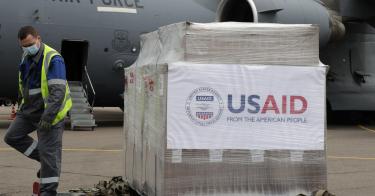The United Kingdom recently moved to integrate its foreign-aid operations more closely with its overall foreign-policy efforts. The United States should strongly consider following suit.
This summer, British Prime Minister Boris Johnson acted to merge the U.K.’s foreign aid agency—the Department for International Development—back into the Foreign and Commonwealth Office, the equivalent of the U.S. Department of State. Johnson’s decision to unite the country’s development and diplomacy agencies into one large ministry is a good one.
The policy foundation of Johnson’s action is a 2019 study of the U.K.’s foreign aid mechanisms published by the Britain-based Henry Jackson Society, for which Johnson himself wrote a Foreword, entitled “Global Britain: A Twenty-First Century Vision.”
Its authors, James Rogers of HJS and Member of Parliament Bob Seely, warned that the foreign policy of a newly independent, post-Brexit U.K. would be at risk of being “less than the sum of its parts….because of a lack of integration” and also because execution of the country’s foreign policy had been stove-piped among too many cabinet-level departments. The cost of duplicative administration mechanisms alone was a significant and unnecessary expense.
DfID had been part of FCO until 1997, when then-Prime Minister Tony Blair spun it out as an independent agency. Blair considered development an apolitical goal and wanted the U.K.’s foreign assistance efforts to be branded as altruistic; transcending the lowly and gritty work of achieving policy goals that merely served the interests of the nation-state and its taxpayers.
Not surprisingly, the recent reform by Boris Johnson has faced intense opposition from government bureaucrats, non-governmental organizations, and others with stakes in the status quo.
American conservatives have advocated for similar reforms of foreign aid almost from the creation of USAID in 1961. Perhaps the most memorable was the multi-year effort by the late Sen. Jesse Helms, then Chairman of the Senate Foreign Relations Committee, who nearly succeeded in merging USAID into the State Department in the mid-1990s. In the end, though, the massive U.S. foreign aid industry called upon many USAID and other foreign assistance private contractors to defeat the Helms’ attempt.
Many in Congress, wedded to earmarks in the annual foreign aid budget that benefit companies and NGOs in their constituencies, also opposed it. Early in President Trump’s first term, another reform effort was launched, but without much success.
In light of the U.K.’s move, however, now would be a good time for the United States government to take a new look at innovative ways that U.S. foreign aid can be delivered more effectively and less expensively through programs that prioritize and complement foreign policy efforts to protect and extend America’s national and economic security objectives.
That was the spirit behind a major effort undertaken two years ago by The Heritage Foundation to encourage the Trump administration to reorient U.S. foreign aid. In a policy paper very similar to the HJS paper that guided the British, Heritage analysts outlined a plan to reshape America’s current aid programs. At present they are too numerous, fragmented, and micromanaged to support U.S. foreign policy objectives efficiently. The study proposed reorganizing and streamlining the disparate aspects of U.S. foreign assistance into three pillars guided by purpose: development assistance, humanitarian assistance, and political and security assistance.
The Heritage study was driven by the unfortunate fact that, however noble the objectives of poverty reduction and economic growth, the actual record of development assistance in improving living standards is not robust. Indeed, the annual Heritage Index of Economic Freedom was begun in 1995 with the specific goal of presenting a private-sector-led, entrepreneurial alternative to development challenges that could actually work.
To prosper and improve their lives, citizens of any country need their government to remove obstacles to facilitate the free flow of capital, goods, services, and ideas. Governments should restrict themselves to maintaining non-discriminatory markets, allocating resources impartially, enforcing the rule of law fairly, protecting property rights, and encouraging individual effort and success. That has been the proven recipe for economic freedom and real human progress.
In pursuit of those goals, the development assistance work of USAID should be redirected in its entirety to the Millennium Challenge Corporation, which already operates to advance the principles outlined above. USAID itself should cease to exist as separate entity.
As for the health and humanitarian assistance that Americans have traditionally, and generously, donated to people around the world, those efforts will be better coordinated if the relevant departments of USAID are transferred to the State Department.
Finally, the U.S. needs to reorient some of its assistance to support more directly its foreign policy and diplomatic efforts to counter efforts of current or potential rivals for power and influence such as China. The existing State Department administered Economic Support Fund (ESF) account serves this purpose in many ways, but would benefit from an explicit mandate. Likewise, the myriad military and security assistance programs should be consolidated, reviewed closely and frequently to avoid calcification based on legacy allocations, and their purpose to advance U.S. security interests made explicit.
With the rising challenges facing America, the Trump administration and Congress should find common cause in reforming America’s foreign assistance agencies and bureaucracies to consolidate and focus them to support more effectively and efficiently the interests of our nation.
This piece originally appeared in Real Clear World



